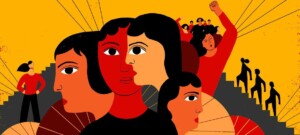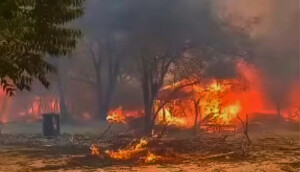Sudan civil society organisations provide aid to Blue Nile state displaced
The Sudanese Organisation for Research and Development (SORD), in cooperation with a number of other civil society organisations, is organising humanitarian assistance for the thousands of people affected by the recent clashes in Blue Nile state. People who sought refuge in neighbouring Sennar are still urgently in need of aid.
 Thousands of people sought refuge in the Blue Nile state capital Ed Damazin, July 15 (Social media)
Thousands of people sought refuge in the Blue Nile state capital Ed Damazin, July 15 (Social media)
The Sudanese Organisation for Research and Development (SORD), in cooperation with a number of other civil society organisations, is organising humanitarian assistance for the thousands of people affected by the recent clashes in Blue Nile state. People who sought refuge in neighbouring Sennar are still urgently in need of aid.
Yesterday, a second batch of relief items that included medical equipment, clothing, and personal hygiene aids were delivered to the Youth Training Centre in El Roseires, near the Blue Nile state capital of Ed Damazin, where a special committee organises the distribution to the thousands of people who sought refuge in the town after they fled fierce intercommunal fighting in the second week of July.
SORD Director Hanan Khamees said in a press statement on Tuesday that the second batch of relief items was well-prepared by the civil society partners and that efforts were made to achieve the principles and values of voluntary and humanitarian work.
She praised the efforts of the Blue Nile Women’s Network for Peace and Development and the Sudan Women’s Network and “their creative initiatives” as they donated an amount of home-made liquid soap, among other aid items.
On July 21, the UN Office for the Coordination of Humanitarian Affairs (OCHA) in Sudan reported that various humanitarian organisations were working in concert with OCHA to provide meals to around 4,500 displaced people, and health and medical supplies for 30,000 people, including emergency health and trauma kits.
Four days later, OCHA cited unconfirmed reports about more than 31,000 people being displaced by the clashes. About 12,600 of them sought shelter in Ed Damazin and El Roseires. Others fled to Sennar, El Gezira, and White Nile state.
Sennar
The about 22,000 people who fled to Sennar are living in dire conditions, activist Mohanad Orabi told Radio Dabanga.
“Most of the humanitarian aid goes to the affected people who fled to Ed Damazin and El Roseires, while those who sought refuge in Sennar camps are still waiting for assistance,” he reported.
“The needs of the newly displaced in Sennar exceed the capacity of the state government, and the few aid items provided by benefactors in Sennar are far from enough,” Orabi said and appealed to humanitarian organizations to provide urgent relief to the displaced in Sennar.
Hundreds of thousands in need
OCHA in Sudan reported today that there are some 442,000 displaced people, vulnerable residents, refugees, and asylum seekers in Blue Nile state who need humanitarian assistance. The displaced people in the region live with host communities as a result of the previous government’s non-encampment policy.
According to OCHA, aid organisations report a deteriorating humanitarian situation, particularly in non-government-controlled areas. Conflict in the region has impacted both livelihoods and the availability of basic services such as education and health care, the UN agenct said.
OCHA further points to the two rival factions of the Sudan People’s Liberation Movement-North (SPLM-N) active in the region: the SPLM-N of Abdelaziz El Hilu which has its stronghold in Kauda in neighbouring South Kordofan and the Blue Nile state faction under the leadership of Malik Agar.
The SPLM-N Agar signed the Juba Peace Agreement with the Sudanese government in October 2020. Agar became member of the Sovereignty Council, and remains in this function until this day.
Last month, Radio Dabanga reported that the El Roseires Resistance Committees also referred to the hostility between rival supporters of the two factions – which led to violent clashes in Blue Nile state in early 2018. They accused the current authorities of negligence because they “chose not to act even after the first attacks”.
The Communist Party of Sudan laid the blame with SPLM-N Agar, accusing the faction of attempting “to seize power and disrupt the fragile peace in the region”. The Forces for Freedom and Change-Central Council (FFC-CC) held the ruling military junta responsible for the violence, saying that the coup d’état of October last year has led to more lawlessness in the country.











 and then
and then